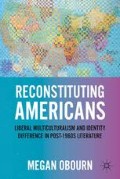Abstract
In Henry Yu’s contribution to the 2000 collection Post-Nationalist American Studies, he poses the following questions about US scholars of American literary and cultural studies: “How does their national identity, even as they act as critics of nationalism, grant them the capability of incorporating multicultural products and perspectives into their lives for their own display and benefit? How does a nationalist enterprise of incorporating knowledge in the interests of national power allow American intellectuals the fantasy of the creation of Knowledge as an unquestioned good?”1 This chapter turns from the more culturally and historically contextualized analyses of Chapters 1, 2, and 3 to address the questions that Yu raises about the US academy. I extend my argument from the previous chapters about the potential pitfalls of an overeager denationalization of American literary studies and add a discussion of the relation between academic liberal multiculturalism and the desire to incorporate knowledges of multicultural difference. In relation to current academic investments in multicultural knowledge accumulation and production, I look at the value and potential limitations of literary aesthetics of internal distantiation by comparing the academic reception of and writing on two novels by Indian-born American author Bharati Mukherjee: Jasmine (1989) and The Holder of the World (1993).
Access this chapter
Tax calculation will be finalised at checkout
Purchases are for personal use only
Preview
Unable to display preview. Download preview PDF.
Notes
Henry Yu, “How Tiger Woods Lost His Stripes: Post-Nationalist American Studies as a History of Race, Migration, and the Commodi-fication of Culture,” in Post-Nationalist American Studies, ed. John Carlos Rowe (Berkeley: University of California Press, 2000), 238.
Bharati Mukherjee, “Beyond Multiculturalism: Surviving the Nineties,” Journal of Modern Literature 20, no. 1 (Summer 1996): 33.
John K. Hoppe, “The Technological Hybrid as Post-American: Cross-Cultural Genetics in Jasmine,” MELUS 24, no. 4 (Winter 1999): 137.
For a concise version of this argument, see Anne Brewster, “A Critique of Bharati Mukherjee’s Neo-nationalism,” SPAN: Journal of the South Pacific Association for Commonwealth Literature and Language Studies 34–35 (1993): 50–59.
For example, see Deepika Bahri, “Always Becoming: Narratives of Nation and Self in Bharati Mukherjee’s Jasmine” in Women, America, and Movement: Narratives of Relocation, ed. Susan L. Roberson (Columbia: University of Missouri Press, 1998), 137–54
For example, see Susan Koshy, “The Geography of Female Subjectivity: Ethnicity, Gender, and Diaspora,” in Contemporary American Women Writers: Gender, Class, Ethnicity, ed. Lois Parkinson Zamora (New York: Longman, 1998), 138–53.
Rey Chow, The Protestant Ethnic & The Spirit of Capitalism (New York: Columbia University Press, 2002), 51.
Bharati Mukherjee, Jasmine (New York: Grove Press, 1989), 9.
Philip Fisher, Still the New World: American Literature in a Culture of Creative Destruction (Cambridge, MA: Harvard University Press, 1999), 192.
Steven J. Belluscio, To Be Suddenly White: Literary Realism and Racial Passing (Columbia: University of Missouri Press, 2006), 4.
Jane Tompkins, Sensational Designs: The Cultural Work of American Fiction 1970–1860 (New York: Oxford University Press, 1985), 126–27.
Jane F. Thrailkill, Affecting Fictions: Mind, Body, and Emotion in American Literary Realism (Cambridge, MA: Harvard University Press, 2007), 23.
See Colin Greer, “The Ethnic Question” Social Text 0, nos. 9/10 (1984): 119–36.
Michael Gorra, “Call it Exile, Call it Immigration,” The New York Times, September 10, 1989.
Christian Moraru, “Purloining The Scarlet Letter. Bharati Mukherjee and the Apocryphal Imagination,” in He Said She Said: An RSVP to the Male Text, eds. Mica Howe and Sarah Appleton Aguiar (London: Fairleigh Dickinson University Press, 2001), 256; emphasis added.
Nalini Iyer, “American/Indian: Metaphors of the Self in Bharati Mukherjee’s ‘The Holder of the World,’” ARIEL 27, no.4 (1996): 35; emphasis added.
Bruce Simon, “Hybridity in the Americas: Reading Condé, Mukherjee, and Hawthorne,” in Postcolonial Theory and the United States: Race, Ethnicity, and Literature, eds. Amritjit Singh and Peter Schmidt [Jackson: University of Mississippi, 2000]: 422.
Bharati Mukherjee, The Holder of the World (Toronto: HarperCollins, First Edition 1993, HarperPerennial Canada Edition, 2003), 31, 8.
Richard Dyer, White (New York: Routledge, 1997), 13.
Beverly Byers-Pevitts, “An Interview with Bharati Mukherjee,” in Speaking of the Short Story: Interviews with Contemporary Writers, eds. Farhat Iftekharuddin, Mary Rohrberger, and Maurice Lee (Jackson: University of Mississippi Press, 1997) 196–97.
Mike Hill, “Introduction: Vipers in Shangri-la: Whiteness, Writing, and Other Ordinary Terrors,” in Whiteness: A Critical Reader, ed. Mike Hill (New York: New York University Press, 1997), 5.
George Lipsitz, The Possessive Investment in Whiteness: How White People Profit from Identity Politics (Philadelphia: Temple University Press, 1998), 93.
See Cheryl Harris, “Whiteness as Property,” Harvard Law Review 106, no. 8 (1993): 1707–91.
Jane Haggis, “White Women and Colonialism: Toward a Non-Recuperative History,” in Gender and Imperialism, ed. Claire Midgley (Manchester: Manchester University Press, 1998), 48.
James Baldwin, “On Being ‘White’ … And Other Lies,” in Black on White: Black Writers on What It Means to Be White, ed. David Roediger (New York: Schocken Books, 1998), 177, 178.
Susan S. Lanser, “Feminist Criticism, ‘The Yellow Wallpaper,’ And the Politics of Color in America,” Feminist Studies 15, no. 3 (1989): 420.
Stanley Fish, Self-Consuming Artifacts: The Experience of Seventeenth Century Literature (Berkeley: University of California Press, 1972), 2.
James Baldwin, “Everybody’s Protest Novel,” in Notes of a Native Son (Boston: Beacon, 1955), 20.
Kevin Johnson, Alan Gomez, and Marisol Bello, “Gates Arrest Reig-nites Debate on Race,” USA Today, July 23, 2009.
Copyright information
© 2011 Megan Obourn
About this chapter
Cite this chapter
Obourn, M. (2011). Academic Investments in Liberal Multiculturalism Bharati Mukherjee’s Representational versus Distantiative Aesthetics. In: Reconstituting Americans. Palgrave Macmillan, New York. https://doi.org/10.1057/9780230339378_5
Download citation
DOI: https://doi.org/10.1057/9780230339378_5
Publisher Name: Palgrave Macmillan, New York
Print ISBN: 978-1-349-29437-4
Online ISBN: 978-0-230-33937-8
eBook Packages: Palgrave Literature CollectionLiterature, Cultural and Media Studies (R0)

